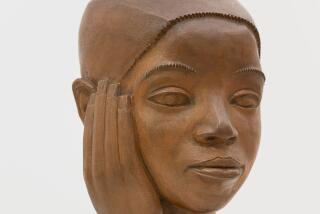Maceo Anderson; Tap Dancer Who Broke Color Line
- Share via
Maceo Anderson, the last original member of the groundbreaking tap-dance act the Four Step Brothers, died in Los Angeles on July 4. He was 90.
Billed in their prime as “eight feet of rhythm,” the Four Step Brothers began in the mid-1920s as a trio of unrelated teens at the famed Cotton Club in New York City and became a quartet in 1938, performing successfully for some 30 years under Anderson’s leadership.
They were the first black act to perform at Radio City Music Hall in New York, the first at the Chez Paris Club in Chicago and the first to break television’s color bar, becoming, as a result, the best-known dance act in the nation.
“We opened doors and paved the way for black artists who came later,” Anderson told the St. Louis Post-Dispatch in 1994. “We were to tap dancing what Duke Ellington, Louis Armstrong and Cab Calloway were to music.”
Anderson started dancing at age 3 in Charleston, S.C., and three years later came to Harlem with his mother on a cotton boat, heading straight for the Hoofers’ Club under the Lafayette Theatre: tap heaven in those days. “I used to sneak up into the balcony [of the Lafayette] to see all the shows,” he recalled in an interview for the book “Tap!” and later met the dancers who would become part of his first performing group at an amateur night there.
Hanging out at the Cotton Club, the group kept pestering Ellington for a chance to perform, and he finally put them on--at intermission, Anderson remembered. “We stayed in the Cotton Club four years!” he said. “And that’s where the Step Brothers was made.”
The group later toured on the Keith-Orpheum circuit, danced annually at Radio City Music Hall for 10 years, went around the world four times, and appeared in such Hollywood features as “It Ain’t Hay” (1943), “Rhythm of the Islands” (1943), “Greenwich Village” (1944), “That’s My Gal” (1947), “Here Come the Girls” (1953) and “The Patsy” (1964).
In 1949, comedian Milton Berle refused to appear on a live NBC telecast of “The Texaco Star Theater” unless Texaco agreed to let the Four Step Brothers perform. The impasse lasted until minutes before air-time, when Texaco relented. Afterward, they danced on “The Ed Sullivan Show,” Bob Hope specials and telecasts featuring Dean Martin and Jerry Lewis, Perry Como and Steve Allen.
In 1994, Anderson said that he had stopped performing after a car crash in the early 1990s: “The Lord saved me so he must want me for something.” He became a minister in the Holy Tabernacle Outreach Mission Church but continued to teach throughout the U.S. and inspire a new generation of tappers.
Beyond their contributions to racial integration in the entertainment world, the Four Step Brothers were important for popularizing rhythm-tap and competition or challenge dancing: both hallmarks of pure African American tap technique. “Rhythm is my business,” Anderson said in his “Tap!” interview. “Rhythm’s what I do.”
When the Four Step Brothers were honored with a star on the Hollywood Walk of Fame in 1988, the Rev. Jesse L. Jackson issued a statement congratulating the members for their “classic elegance.”
“The Four Step Brothers are not merely an entertainment troupe, they are an institution that no stage or screen can contain. . . ,” Jackson wrote. “‘They were and remain the greatest.”
By that time, however, Anderson claimed, “I’m not dancing for me any more--now I only dance for the Lord. . . .”
“Back in South Carolina, I used to dream of boarding the train going north--to what I thought was heaven. Now, I have a vision of getting a front seat on the train where you don’t need bags or a ticket--and then I’ll put on my dancing shoes and dance all over heaven.”
More to Read
The biggest entertainment stories
Get our big stories about Hollywood, film, television, music, arts, culture and more right in your inbox as soon as they publish.
You may occasionally receive promotional content from the Los Angeles Times.










